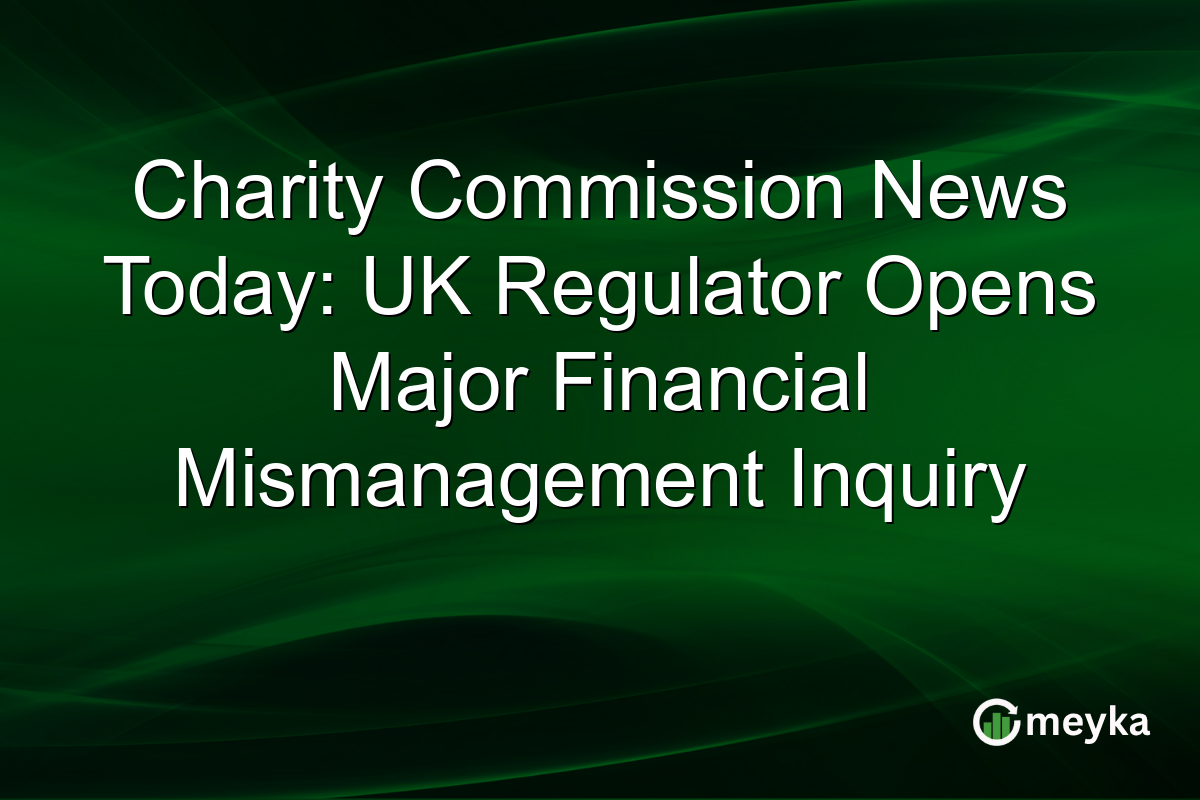Charity Commission News Today: UK Regulator Opens Major Financial Mismanagement Inquiry
The Charity Commission, the UK’s key regulatory body for charities, has launched a significant financial mismanagement inquiry targeting several large charities. Recent reports suggest substantial fund misallocation, raising concerns over financial management within the charity sector. This action by the UK charity regulator has stirred the community, prompting questions about oversight, financial accountability, and donor trust.
Scope and Impact of the Inquiry
The UK charity regulator has undertaken this inquiry to address alarming reports of financial mismanagement among prominent charities. These organizations have been accused of mishandling large amounts of funds, which has led to immediate scrutiny and concern.
The inquiry seeks to understand how these funds were spent and whether the misallocation was a result of oversight failures. This development has also caught the attention of donors and institutional investors, who are now wary of future contributions. Such actions can heavily influence funding flows within the sector, potentially impacting the financial stability of other charities as well.
Read more about the investigations in Financial Times.
For many organizations, proving robust financial practices will become more crucial in maintaining donor confidence.
Sector-Wide Repercussions
This inquiry is expected to catalyze changes across the charity sector. The UK charity regulator’s actions aim to reinforce trust among stakeholders and enhance the framework for financial accountability.
Charity sector accountability will likely be in focus for the coming months, with heightened expectations for transparency and detailed financial reporting. As a result, charities of all sizes may need to revisit their financial practices to ensure compliance and regain donor trust.
Pledges for reform and adherence to stricter guidelines could emerge, reshaping how charities operate and report their financial activities. This could be a pivotal moment for broader sector reforms, encouraging better governance throughout.
Donor and Stakeholder Reactions
Stakeholder reactions have been swift, with many expressing concerns over the potential negative impact on donor confidence and funding. Donors are particularly cautious, fearing that their contributions may not be utilized as intended.
Many institutional investors who support these entities are calling for improved governance mechanisms. Assurance of strong financial oversight can help stabilize trust and reinstate funding lines, which are crucial for the operational viability of the affected charities.
This significant regulatory probe serves as a wake-up call for all stakeholders involved, urging them to prioritize better financial management and transparency.
Potential Steps for Affected Charities
Charities facing scrutiny will need to act decisively to mitigate damage. Implementing comprehensive audits, strengthening internal controls, and ensuring transparent communications with stakeholders are vital steps.
Additionally, these organizations must collaborate closely with the regulator to correct any violations. Engaging with donors effectively during this period can help rebuild trust and demonstrate a commitment to integrity and accountability.
For the sector as a whole, strengthening financial reporting standards and enhancing oversight can prevent similar issues from occurring in the future.
Final Thoughts
The Charity Commission’s decisive inquiry into financial mismanagement highlights the pressing need for accountability in the UK charity sector. This regulatory action underscores the importance of proper financial oversight to maintain donor trust and ensure the efficient use of funds. With donor confidence shaken, charities must now focus on reinforcing their financial practices and transparency. Stakeholders will be particularly attentive to how these organizations respond and reform their approaches.
Looking ahead, charities might need to consider these challenges as opportunities for systemic improvements. By adopting stronger financial controls and enhancing accountability, the sector can restore trust and stabilize funding flows. As the inquiry unfolds, stakeholders will be keenly watching for meaningful changes that safeguard the future of charitable giving in the UK.
Organizations can consider platforms like Meyka to aid in achieving this, offering real-time insights and predictive analytics to ensure financial soundness. Ensuring transparency and accountability will not only satisfy current stakeholders but can also attract future investments and support. The sector stands at a crossroads, and the decisions made now could define its trajectory for years to come.
FAQs
The inquiry was prompted by reports of significant fund misallocation among large UK charities. Such reports raised concerns about financial mismanagement and sparked a need for regulatory scrutiny to uphold sector accountability.
Donor trust may be impacted as contributors become wary of financial practices within charities. Ensuring transparency and accountability is vital to regain donor confidence and secure future support.
Charities may face stricter financial reporting standards and enhanced oversight to prevent future misallocations. Improved governance and transparent practices could emerge as essential reforms following the inquiry.
Financial oversight is crucial to ensure donors’ funds are used effectively. It helps maintain trust, attract future contributions, and ensures charities can continue their vital work without financial disruption.
Disclaimer:
This is for information only, not financial advice. Always do your research.






